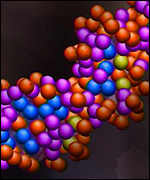Difference between revisions of "Homosexuality and Genetics"
JWeatherman (Talk | contribs) (Do not commit censorship) |
Conservative (Talk | contribs) (→Work of the Human Genome Project: homosexuality is not genetic. get over it.) |
||
| Line 32: | Line 32: | ||
Homosexual ''behavior'' [[Homosexuality and choice|is voluntary and subject to control by the human will]], just as heterosexual behavior is. Sex and intimacy, though, are basic necessities of human life, and acting on them, whether they be heterosexual or homosexual, is natural. | Homosexual ''behavior'' [[Homosexuality and choice|is voluntary and subject to control by the human will]], just as heterosexual behavior is. Sex and intimacy, though, are basic necessities of human life, and acting on them, whether they be heterosexual or homosexual, is natural. | ||
| − | |||
| − | |||
| − | |||
Revision as of 21:29, April 23, 2009
In regards to homosexuality and genetics, science has yet to find a link in terms of it being a cause of homosexuality, although a common argument is that an inclination to homosexuality is inborn and immutable. It is widely believed that the public will become more accepting of homosexuality if they are convinced that it is inborn and immutable. For example, neuroscientist and homosexual Simon Levay stated: "...people who think that gays and lesbians are born that way are also more likely to support gay rights."[1] However, a genetic basis to homosexual desire does not prevent homosexuals from choosing not to participate in homosexual activities.
When asked if homosexuality was rooted solely in biology, gay gene researcher, Dean Hamer, replied, "Absolutely not. From twin studies, we already know that half or more of the variability in sexual orientation is not inherited. Our studies try to pinpoint the genetic factors...not negate the psychosocial factors" (Anastasia, 1995, p. 43).[2]
No professional scientist in the last 40 years has even claimed to have found any evidence that queerness is always genetic in all cases. Even the highly publicized identical twin studies by Michael Bailey and Richard Pillard, which were so often touted as evidence for a "gay gene," never found that any more than 52% of the identical twins of queer people were queer. The other 48% of identical twins of queer men were not queer. This leaves at least 48% of the queer community unaccounted for by genetic theories.[Citation Needed]
Science has found no link

However, there is no scientific consensus on the subject, and the American Psychological Association's assertion is that:
- ...most scientists today agree that sexual orientation is most likely the result of a complex interaction of environmental, cognitive and biological factors.[3]
Furthermore, the American Psychological Association has no sound data to support the view that homosexuality is biological in origin and Concerned Women of America reports the following:
| “ | In May 2000, the American Psychiatric Association issued a Fact Sheet, "Gay, Lesbian and Bisexual Issues," which includes this statement:
"Currently, there is a renewed interest in searching for biological etiologies for homosexuality. However, to date there are no replicated scientific studies supporting any specific biological etiology for homosexuality."[4] |
” |
Research suggests that adoptive brothers are more likely to both be homosexuals than the biological brothers, who share half their genes. This data prompted the journal Science to report "this . . . suggests that there is no genetic component, but rather an environmental component shared in families".[5][6][7] However, in regards to psychosocial and biological theories in regards to the origin of homosexuality, Columbia University psychiatry professors Drs. William Byrne and Bruce Parsons stated in 1994: "There is no evidence that at present to substantiate a biological theory. [T]he appeal of current biological explanations for sexual orientation may derive more from dissatisfaction with the present status of psychosocial explanations than from a substantiating body of experimental data".[8]
Herbert Hendin wrote:
| “ | Anthropologists had observed that relatively uncompetitive primitive cultures such as those that do not distinguish or reward the best hunters in distinction to the other men in the tribe have virtually no homosexuality."[9] | ” |
Dr. Tahir I. Jaz, M.D., Winnipeg, Canada states: "The increasing claims of being "born that way" parallels the rising political activism of homosexual organisations, who politicise the issue of homosexual origins . In the 1970s, approximately ten percent of homosexuals claimed to be "born homosexual" according to a large scale survey....However, in a survey in the 1980s, with the homosexual rights movement increasingly becoming active, thirty-five percent claimed to be born that way.[10]
Dr. Dean Hamer is a researcher often cited to show that there is empirical data supporting the notion that homosexuality is genetic in origin. News organizations like National Public Radio and Newsweek have done news stories regarding his work.[11] In regards to the press trumpeting various findings genetics-of-behavior research uncritically the science journal Science stated the following in 1994:
| “ | Time and time again, scientists have claimed that particular genes or chromosomal regions are associated with behavioral traits, only to withdraw their findings when they were not replicated. "Unfortunately," says Yale's [Dr. Joel] Gelernter, "it's hard to come up with many" findings linking specific genes to complex human behaviors that have been replicated. "...All were announced with great fanfare; all were greeted unskeptically in the popular press; all are now in disrepute."[12] | ” |
Martin A. Silverman, M.D. wrote regarding a famous study of Dr. Dean Hamer:
| “ | On July 16, 1993, it was reported in Science (pp. 291, 321) that geneticist Dean Hamer and his team at the National Cancer Institute had reported on a study involving 40 pairs of brothers both of whom were gay that had led them to conclude that they had discovered a factor on the X chromosome through which gayness was genetically transmitted to them from their mothers. This was hailed as proof that homosexuality in men is biological in origin. Two years later, however, Eliot Marshall reported in Science (June 30, 1995, p.268) George Ebers and George Rice of the University of Western Ontario had unsuccessfully attempted to replicate Hamer's findings and had "found no evidence that gayness is passed from mother to son" genetically. He also reported that the Office of Research Integrity in the Department of Health and Human Services was investigating Hamer's work.[13] | ” |
Homosexual behavior is voluntary and subject to control by the human will, just as heterosexual behavior is. Sex and intimacy, though, are basic necessities of human life, and acting on them, whether they be heterosexual or homosexual, is natural.
See Also
- Causes of Homosexuality
- Religious Upbringing and Culture Affects Rates of Homosexuality
- Homosexuality and Choice
- Homosexuality
External links
- "Homosexuality Is Not Hardwired," Concludes Dr. Francis S. Collins, Head Of The Human Genome Project
- Is there a "gay gene"? - explores how the media misrepresented the science
References
- ↑ http://www.family.org/socialissues/A000000682.cfm
- ↑ Homosexuality 101: What Every Therapist, Parent, And Homosexual Should Know - Julie Harren, Ph.D., LMFT
- ↑ http://www.apa.org/topics/orientation.html#whatcauses
- ↑ http://www.cwfa.org/articledisplay.asp?id=5458&department=CFI&categoryid=papers
- ↑ (Science, Vol. 262, page 2063, December 24, 1993)
- ↑ http://www.trueorigin.org/gaygene01.asp
- ↑ [http://www.freetobeme.com/r_biol.htm
- ↑ http://www.cwfa.org/images/content/bornorbred.pdf
- ↑ "Kardiner and Linton, in a psychoanalytic anthropological study of Tanala, examined homosexuality in the context of the entire Tanalese culture (1939). They showed that a dramatic rise in homosexuality when social and economic forces inflamed competitiveness was one of several manifestations of frustrated rage (crime was another) among young men who were having particular difficulty with the pressures the culture was exerting on them. Homosexuality: The Psychosocial Dimension - Journal of American Academy of Psychoanalysis, 6:479-496(1978)
- ↑ http://www.flyfishingdevon.co.uk/salmon/year2/hormones/tahir.htm
- ↑ http://www.narth.com/docs/istheregene.html
- ↑ Mann, C. Genes and behavior. Science 264:1687 (1994)
- ↑ http://www.narth.com/docs/1996papers/silverman.html
